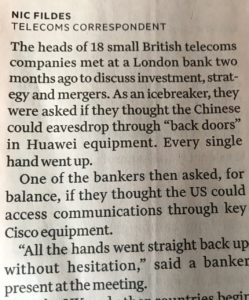The iPad: ten years on and still a work in progress
This morning’s Observer column
while the iPad I use today is significantly better and more functional than its 2010 predecessor, it’s still not a replacement for a laptop. Anything that involves multitasking – combining content from a variety of applications, for example – is clumsy and nonintuitive on the iPad, whereas it’s a breeze on a Mac. Given that user-interface design has traditionally been one of Apple’s great strengths, this clumsiness is strange and disappointing. Somewhere along the line, as veteran Apple-watcher John Gruber puts it, the designers made “profound conceptual mistakes in the iPad user interface, mistakes that need to be scrapped and replaced, not polished and refined”. Steve Jobs’s tablet may have come a long way, but it’s still a work in progress.
Do read the entire piece
A Republic if they could keep it. Looks like they couldn’t
As the farcical Senate Impeachment ‘trial’ just concluded what kept running through my mind was the story of what Benjamin Franklin said as he was leaving the Constitutional Convention of 1787 on the final day of deliberation. A woman asked him “Well Doctor what have we got, a republic or a monarchy?” To which Franklin famously replied, “A republic . . . if you can keep it.”
By acquitting Trump, the Senate seems to have confirmed the failure of that attempt. Trump is now effectively a monarch, floating above the law. So, one wonders, what happens next? As a habitual offender, he will undoubtedly commit more crimes. As a sitting President, it seems that he cannot be indicted by the normal processes of law enforcement. For him, Congress is the only constitutional authority that can punish him. But this Congress spectacularly refused to do so. So unless the Republicans lose control of the Senate in November, Trump will be entirely free of legal restraints. And supposing he loses (unlikely prospect at present), would he actually stand down? And in that eventuality, who would physically remove him from the White House?
_________________________
Presidential power and the Net
Further to the above thoughts about the untrammelled misuse of Presidential power, Jessica Rosenworcel, who is an FCC Commissioner, gave a sobering keynote address to the FCC’s ‘State of the Net’ conference in Washington on January 28.
She began by describing what’s currently going on in Kashmir, where the Indian government has cut off Internet connection for the 7 million people who live in that disputed territory. In one vivid passage, she described how Kashmiris are coping with this blackout:
Every morning like clockwork hundreds of passengers cram into a train out of the valley for a 70-mile journey to the nearest town with a connection. They are packed so tightly that they can barely move. If all goes well, they will be back before nightfall. Kashmiris have dubbed the train the “Internet Express.” It carries people hoping to renew driver’s licenses, apply for passports, fill out admission forms, check e-mail, and register for school exams. This is how they keep up with modern life, thanks to the shutdown.
Then Commissioner Rosenworcel turns to her audience:
Now if you are thinking this does not concern you because all of this is happening a world away, I understand. After all, the shutdown in the Kashmir Valley followed from the state invoking the Indian Telegraph Act of 1885, a law that dates to the British colonial era. Moreover, a few weeks ago Indian courts ruled that an indefinite internet shutdown is an abuse of power—although that decision alone does not restore all service. So you might think this is at some distance from what could happen in the United States. But you might want to think again.
Specifically, they might need to take a look at Section 706 of the Communications Act. The Section allows the President to shut down or take control of “any facility or station for wire communication” if he proclaims “that there exists a state or threat of war involving the United States.” With respect to wireless communications, suspending service is permitted not only in a “war or threat of war” but merely if there is a presidential proclamation of a “state of public peril” or simply a “disaster or other national emergency.” There is no requirement in the law for the President to provide any advance notice to Congress.
“This language”, says Rosenworcel,
is undeniably broad. The power it describes is virtually unchecked. So maybe some context will help. The changes to this section of the law about wire communications were made within a month after the attack on Pearl Harbor. It was passed at a time when Congress was laser focused on developing new ways to protect our safety and security.
Now of course Section 706 has not (yet) been applied to the Internet, and when the Act was amended after Pearl Harbor “wire communication” meant telephone calls or telegrams. But remember the bulk of US communications law dates back to 1934 and remains the framework for US communications infrastructure. And she points out that, in a 2010 report, the Senate concluded that Section 706 “gives the President the authority to take over wire communications in the United States and, if the President so chooses, shut a network down.”
So it remains true that if a sitting President wants to shut down the internet or selectively cut off a service, all it takes is an opinion from his Attorney General that Section 706 gives him the authority to do so.
That’s alarming. Because if you believe there are unspoken norms that would prevent us from using Section 706 this way, let me submit to you that past practice may no longer be the best guide for future behavior. Norms are being broken all the time in Washington and relying on them to cabin legal interpretation is not the best way to go.
Which rather puts the Impeachment case in a different light. Shutting down the US Internet would be unthinkable, wouldn’t it? Before nodding your head in vigorous agreement, ask yourself how many ‘unthinkable’ things have happened since Trump took office?






